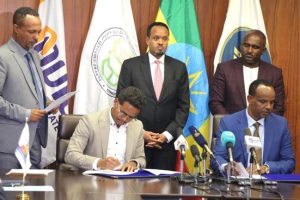
● Experts give insights into legal solutions
The much anticipated Ethiopian 2020 general elections would not be held as per the scheduled due to coronavirus.
Following this announcement by National Electoral Board of Ethiopia, a number of politicians and legal experts have been debating on how the incumbent gain legitimacy to run the county as its term of office is over by end of coming September.
Moreover, the country is now under State of Emergency to contain the deadly virus.
Addis Ababa University Law Scholar Mulugeta Aregawi defines State of Emergency as a sign of the occurrence of national disaster that forces the government to adopt a new approach to control the devastations under a new rule and regulation.
State of Emergency breaches previous laws and activities in that country until the good day comes.
The command post that established to execute the State of Emergency is like an informal government that will administer the nation without the constitution to achieve the intended goal, he says.
“It is just like declaring a martial law or a military government as state of emergency gives unlimited power to the executive body.”
Now, the question comes here about the legitimacy of the government since its five term ends together with the state of emergency after five months.
.
For Law Scholar Sisay Mengiste (PhD) , the decree of the State of Emergency and the postponement of the election are pivotal in a bid to focus on current national disaster, coronavirus.
Sisay told The Ethiopian Herald that while the parliament has not decided the postponement yet, the election is technically postponed as the government is ensuring state of emergency that prohibit gatherings and movements which are the inevitable activities for vote.
The house has already sustained the time table of the election when it approved the State of Emergency proclamation that will have a due date up to five months and beyond according to circumstances, he notes.
Holding election is not a must since the approval of the emergency that includes the suspension of conducting election and many laws and rights stipulated under the constitution, as to Sisay.
In addition, the pandemic is a serious problem in terms of conducting the election as it threatens public health, security and peace, he says.
Some parties have been urging for the postponement of the election mentioning that there is instability and absence of rule of law to advocate manifesto and to open bureaus in states.
Fortunately, the pandemic occurs to negotiate the parties and now the postponement has become a must. Therefore, the election might be held at the end of next year if the country practically wins the war against the virus, according to Sisay.
Therefore, the pandemic can be taken as a blessing in disguise as the deferral might help to create conducive environment to the upcoming election through pacifying the nation.
Regardless of its arguing conditions, some parties especially Abronet also asked for the establishment of transitional government than undertaking election.
However, the government has not accepted this as it had various options to stay in power by issuing the state of emergency or amending the constitution that entails about election schedule, according to Sisay.
The parliament has technically extended its and government’s term by approving the emergency until the pandemic is put under control, he says.
On the other side, the constitution has its own constraints related to the election especially in framing time table or indentifying exceptions about postponement which needs amendment, Sisay underlines.
It can be possible to amend the constitution article that narrates about election schedule with two third vote of the parliament but this should be at the end of the emergency, according to Mulugeta.
On the other way, the prime minister can extend the term of his government dissolving the parliament before it’s overdue, he indicates.
“Therefore, there are two options to legitimize the current government either through extending the state of emergency or dispersing the parliament before the end of its term, ” Mulugeta reiterates .
Some contesting parties recommend “extra constitutional” negotiation to fill the power vacuum caused by election delay and constitutional restraints, it was learnt.
The Ethiopian Herald April 14/2020
BY YOHANES JEMANEH



